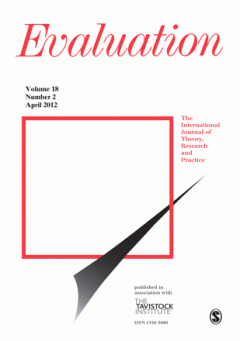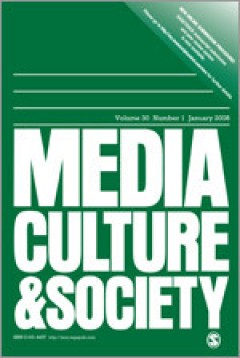Filter by

Modes of interactivity : analysing the webdoc
The webdocumentary positions itself as documentary re-mediated for the internet age. Not only does the name webdocumentary consciously reference film and television documentary but it is possible to trace continuities in representational strategies, purpose and production practices that situate the webdoc within the documentary tradition. In spite of this family resemblance, however, the webdoc…
- Edition
- Vol. 34 no. 2, March 2012,pp. 195-210
- ISBN/ISSN
- 01634437
- Collation
- -
- Series Title
- Media Culture Society
- Call Number
- -

‘A genuinely emotional week’ : learning disability, sport and television …
In July 2009, the Special Olympics Great Britain National Summer Games for athletes with learning disabilities were held in Leicester. Uniquely the Games achieved considerable television news coverage. This article offers a preliminary analysis of television representations of the Games. National TV coverage of the Paralympics is now established, but Special Olympics � and sport for people with…
- Edition
- Vol. 34 no. 2, March 2012,pp. 211-227
- ISBN/ISSN
- 01634437
- Collation
- -
- Series Title
- Media Culture Society
- Call Number
- -

Stigma and Status : Interracial Intimacy and Intersectional Identities among …
- Edition
- Vol. 26 no. 2, April 2012, pp. 165-189
- ISBN/ISSN
- 08912432
- Collation
- -
- Series Title
- Gender & Society
- Call Number
- -
- Edition
- Vol. 26 no. 2, April 2012, pp. 165-189
- ISBN/ISSN
- 08912432
- Collation
- -
- Series Title
- Gender & Society
- Call Number
- -

“I’m in Control” : Compensatory Manhood in a Therapeutic Community
Based on participant observation and in-depth interviews, this article analyzes the ways that male residents in a drug treatment program signified a masculine self through compensatory manhood acts. I analyze four strategies of identity work that men used during group accountability sessions called �games�: (1) signifying masculinity through aggression; (2) subordinating women and nonconvention…
- Edition
- Vol. 26 no. 2, April 2012,pp. 190-215
- ISBN/ISSN
- 08912432
- Collation
- -
- Series Title
- Gender & Society
- Call Number
- -

Good Guys With Guns : Hegemonic Masculinity and Concealed Handguns
In most states in the U.S. it is legal to carry a concealed handgun in public, but little is known about why people want to do this. While the existing literature argues that guns symbolize masculinity, most research on the actual use of guns has focused on marginalized men. The issue of concealed handguns is interesting because they must remain concealed and because relatively privileged men a…
- Edition
- Vol. 26 no. 2, April 2012,pp. 216-238
- ISBN/ISSN
- 08912432
- Collation
- -
- Series Title
- Gender & Society
- Call Number
- -

“. . . He’s Just Swapped His Fists for the System” The Governance of Ge…
In this article, we investigate the state�s role in the reproduction of relations of male dominance between separated parents through custody law. We argue that three �logics� shape the current operation of family law�durability, gender neutrality and present/future temporality�such that custody law is not simply a mechanism of dispute resolution between parents; it is also a vehicle for the di…
- Edition
- Vol. 26 no. 2, April 2012,pp. 239-260
- ISBN/ISSN
- 08912432
- Collation
- -
- Series Title
- Gender & Society
- Call Number
- -

Women’s Attitudes Toward Biomedical Technology for Infertility : The Case f…
Research has consistently revealed gender differences in attitudes toward science and technology. One explanation is that women are more personally affected by particular technologies (e.g., biomedical interventions), so they consider them differently. However, not all women universally experience biomedical technologies. We use the concept of technological salience to address how differences i…
- Edition
- Vol. 26 no. 2, April 2012,pp. 261-289
- ISBN/ISSN
- 08912432
- Collation
- -
- Series Title
- Gender & Society
- Call Number
- -

Exploring Bias in Math Teachers’ Perceptions of Students’ Ability by Gend…
This study explores whether gender stereotypes about math ability shape high school teachers� assessments of the students with whom they interact daily, resulting in the presence of conditional bias. It builds on theories of intersectionality by exploring teachers� perceptions of students in different gender and racial/ethnic subgroups and advances the literature on the salience of gender acros…
- Edition
- Vol. 26 no. 2, April 2012,pp. 290-322
- ISBN/ISSN
- 08912432
- Collation
- -
- Series Title
- Gender & Society
- Call Number
- -

The life-cycle approach to performance management: Implications for public ma…
This article discusses how performance-management systems may be conceptualized as tools with a life cycle consisting of several stages. Studies on public-sector performance management generally concern the question of how management can design these systems or address dysfunctional effects when they are used. This article, however, argues that the research in this field should cover the entire…
- Edition
- Volume 18 Number 2, April 2012 p. 159-175p.
- ISBN/ISSN
- 1356-3890
- Collation
- 159-175p.
- Series Title
- Evaluation
- Call Number
- -

Is realist evaluation keeping its promise? A review of published empirical st…
This overview aims to stimulate conceptual and practical discussions to help unlock the full potential of realist evaluation in health systems research. Based on a structured literature search, this review maps how the concepts of realist evaluation are applied in health systems research and which methodological problems are encountered. We found a great diversity in the depth of application of…
- Edition
- Volume 18 Number 2, April 2012 p. 1192-212p.
- ISBN/ISSN
- 1356-3890
- Collation
- 192-212p.
- Series Title
- Evaluation
- Call Number
- -

Experimentalism and development evaluation: Will the bubble burst?
Bridging the current divide of opinion about experimentalism would help protect an evaluation brand currently under threat in international evaluation circles. In order to help settle a lingering and unnecessary controversy, this opinion article describes the policy force field that triggered the recent surge of interest in experimental methods in development evaluation; digs up the historical …
- Edition
- Volume 18 Number 2, April 2012 p. 213-229
- ISBN/ISSN
- 1356-3890
- Collation
- 213-229p.
- Series Title
- Evaluation
- Call Number
- -

A trial of impact evaluation utilizing effect size statistics: Its applicatio…
This article proposes a method of evaluating effect, impact and efficiency of treatment using the standardized mean difference (SMD) of outcomes between the treatment and the control groups. Since the SMD is commensurable (divisible and measurable by a common standard), here it is given a unit name �effect� as an expression of the �standardized effect�. Based on the assumption that impact is th…
- Edition
- Volume 18 Number 2, April 2012 p. 230-245
- ISBN/ISSN
- 1356-3890
- Collation
- 230-245p.
- Series Title
- Evaluation
- Call Number
- -

A socio-political framework for evaluability assessment of participatory eval…
Jointly conducted with a coalition of HIV/AIDS community-based organizations (CBOs), this evaluability assessment sought to better understand the factors that affect the feasibility of a participatory program evaluation to be undertaken in partnership with the CBOs� non-governmental-organization members and public-health agencies. Participatory evaluations and partnerships are grounded in socia…
- Edition
- Volume 18 Number 2, April 2012 p. 246-259
- ISBN/ISSN
- 1356-3890
- Collation
- 246-259p.
- Series Title
- Evaluation
- Call Number
- -

A realist diagnostic workshop
The realist approach can now be said to be part of the repertoire of evaluation methods. There has been a corresponding shift in methodological focus. Polemical thrust and counter-thrust about the realist contribution as compared to that of other evaluative approaches such as randomized trials and meta-analysis has given way to closer examination of its practice �on the ground�. This article se…
- Edition
- Volume 18, Number 2, April 2012 p.176-191
- ISBN/ISSN
- 1356-3890
- Collation
- 176-191p.
- Series Title
- Evaluation
- Call Number
- -

One earthquake, two tales: narrative analysis of the tenth anniversary covera…
This article studies media coverage of the �921� Earthquake in Taiwan during two periods in 2009, ten years after the disaster, which occurred on 21 September 1999 (the date which provided the event with its compressed identifier). First it looks at coverage in the wake of another major disaster (Typhoon Morakot) that occurred just before the tenth anniversary of the earthquake, and then during…
- Edition
- Volume 34 Number 3 April 2012, p. 280-295
- ISBN/ISSN
- 0163-4437
- Collation
- -
- Series Title
- Media Culture & Society
- Call Number
- p. 280-295

Trends in political television fiction in the UK: Themes, characters and narr…
British television has a long tradition of broadcasting �political fiction� if this is understood as telling stories about politicians in the form of drama, thrillers and comedies. We identify and discuss three genres in which UK political TV fiction has been shaped throughout the decades: comedy, thriller and drama. We examine the characters, themes and narratives in these genres and assess wh…
- Edition
- Volume 34 Number 3 April 2012, p. 263-279
- ISBN/ISSN
- 0163-4437
- Collation
- p. 263-279
- Series Title
- Media Culture & Society
- Call Number
- -

Constructing the public at the royal wedding
This article examines the way ordinary members of the public, who were present at the celebrations for the 2011 UK royal wedding, were constructed in the televised coverage of the event on the BBC and ITV. It draws on theories of media events and on theories of the mediated construction of the views of ordinary citizens, and focuses on the way vox-pop interviews and inferences about what the pu…
- Edition
- Volume 34 Number 3 April 2012, p. 296-311
- ISBN/ISSN
- 0163-4437
- Collation
- p. 296-311
- Series Title
- Media Culture & Society
- Call Number
- -

At the crossroads of migrant workers, class, and media: a case study of a mig…
This article examines Migrant Workers� Television (MWTV) in Korea, exploring relationships between migration, media, and class. Existing studies on migrants have mainly focused on the ethnic and media consumption sides of migration. However, MWTV provides a unique picture of migrants, who joined together across diverse ethnic backgrounds and started a media production NGO with shared class inte…
- Edition
- Volume 34 Number 3 April 2012, p. 312-327
- ISBN/ISSN
- 0163-4437
- Collation
- p. 312-327
- Series Title
- Media Culture & Society
- Call Number
- -

Alan Freed still casts a long shadow: the persistence of payola and the ambig…
Despite the enormous changes in the music industry in recent years, some things have persisted. Payola, the exchange of money or promotional consideration for radio airplay, has persisted if not increased over the past decade in the United States. This is due to the corresponding persistence of a series of contradictory social relationships between broadcasters, their sponsors and the audiences…
- Edition
- Volume 34 Number 3 April 2012, p. 328-342
- ISBN/ISSN
- 0163-4437
- Collation
- p. 328-342
- Series Title
- Media Culture & Society
- Call Number
- -

The life cycle of iconic sound bites: politicians’ transgressive utterances…
Politicians in contemporary societies constantly appear in and talk to the media. While media appearances constitute opportunities to communicate ideas and images, politicians can damage their own reputation through making statements that transgress political and/or cultural norms. Politicians� transgressive utterances not only attract negative media coverage � they may also be recycled in medi…
- Edition
- Volume 34 Number 3 April 2012, p. 343-358
- ISBN/ISSN
- 0163-4437
- Collation
- p. 343-358
- Series Title
- Media Culture & Society
- Call Number
- -
 Computer Science, Information & General Works
Computer Science, Information & General Works  Philosophy & Psychology
Philosophy & Psychology  Religion
Religion  Social Sciences
Social Sciences  Language
Language  Pure Science
Pure Science  Applied Sciences
Applied Sciences  Art & Recreation
Art & Recreation  Literature
Literature  History & Geography
History & Geography